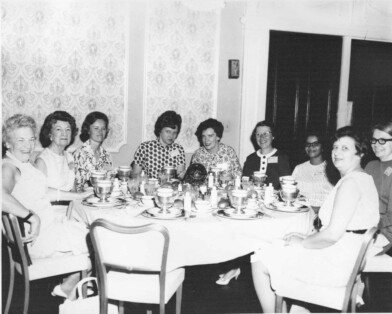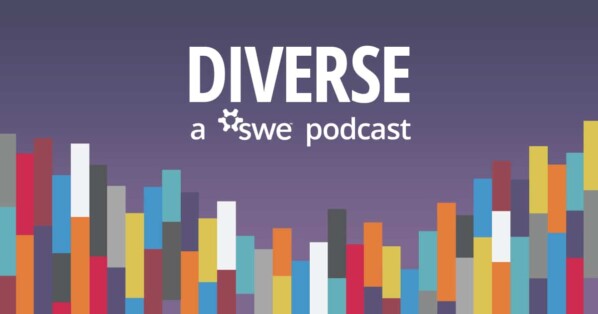Listen to the archived podcast or read the transcript below, then make sure to share it with your colleagues and friends! Be sure to check out our other archives podcasts, as well.

Troy Eller English: Welcome to SWE Stories: Tales from the Archives. I’m Troy Eller English, SWE’s archivist.
Anne Perusek: And I’m Anne Perusek, SWE’s director of editorial and publications. In our last episode, we featured the first three speakers from a panel of early SWE Achievement Award recipients, recorded at the 1968 SWE national convention – as our annual conference was called back then.
Eller English: Yes, we heard from 1956 Achievement Award recipient Elise Harmon, 1957 recipient Rebecca Sparling, and 1963 recipient Beatrice Hicks, who is also our Society’s very first president.
Perusek: Also in the last episode, panelist and 1961 Achievement Award recipient Laurel van der Wal Roennau was mysteriously absent and, Troy, you suggested that in this episode we would hear Dr. Grace Murray Hopper threaten blackmail.
Eller English: She does indeed, although in a loving and humorous way. In addition to being a natural born comedienne, Hopper was a pioneer and received SWE’s Achievement Award in 1964 for her visionary leadership in early computer programming and software development.
Perusek: Yes, and I would like to mention that while she received many awards and honors in her lifetime, but outside U.S. Navy, SWE was the first organization to honor her work.
Eller English: And I would like to mention, as we did in our last episode, that this panel was recorded some 52 years ago on reel-to-reel audio magnetic tape, and as such the recording has a murkiness authentic to the time period—a feature, not a flaw. But you may follow the transcript for this episode on alltogether.swe.org. Just search for “SWE Stories.”
Perusek: So, why does Grace Murry Hopper threaten the computer industry with blackmail, and will Laurel van der Wal Ronneau make it to the panel in time? We’ll let 1968 SWE president Alice Morgan Martin continue moderating this 1968 panel of past SWE Achievement Award recipients so we can find out.
[Audio excerpt from 1968 SWE National Convention Achievement Award recipient panel]
Alice Morgan Martin: Laurel Roennau has arrived, but let’s give her a little chance to catch her breath. (laughter) So, we’ll go on with the next one.
In 1964, Dr. Grace Murray Hopper received the SWE Achievement Award in recognition of her significant contributions to the burgeoning computer industry as an engineering manager and originator of automatic programming systems. She is internationally known for her original work in computer programming.
Grace Hopper is a graduate of Vassar, received her M.A. and Ph.D. degrees from Yale University. She has authored many published technical articles. During World War II, she entered military service. Assigned to the Bureau of Ordinance Computation Project at Harvard, she developed the original operating program for the Mark I computer. She was retired from the Naval Reserve in 1966 but reported on active duty seven months later. Grace is now stationed in the Pentagon, a Commander in the United States Navy, and reports to the Special Assistant to the Secretary of the Navy. She is on special military leave from her full-time position with UNIVAC, and she is now directing the Navy Programming Languages Standards Group.
Her most recent honor was conferred by the Philadelphia Section IEEE, the Philadelphia Section Achievement Award. And the Miami Valley Computer Association presented her the Connelly Memorial Award for her outstanding contribution to the field of electronic data processing. It is indeed a pleasure to introduce Commander Grace Murray Hopper. (applause)
Grace Murray Hopper: Good morning. The SWE Award was of course the high point of all the awards, except for one, and that was the very great privilege of returning on active duty, and once again wearing my uniform in the United States Navy. This has been a curious assortment of years. I’ve been made acutely aware of the fact that I was getting older. Retirement from the navy—they asked for some of my original work and I took it down to the Smithsonian. (laughter) I fled after being there twenty minutes because my computers and my work were there, and I was afraid they’d put me in there, too. (laughter)
When I joined—when 1942 came, and World War II, my entire life did a turnover, and everything that had happened before that had sort of collapsed into no years at all, and everything began over again. And it’s almost happened again, in that the things that happened before I came back into the navy have sort of collapsed into a very small space of time, and everything has been happening since the day I came back.
I learned a great many things. I think everyone should probably serve an internship in government, and in the navy, and in Washington. You’ll never learn so much in all your life. (laughter) For one thing, I learned that there was—I was given four people, no time, and zero budget to get something done. (laughter) This had one very great advantage, in that when the ten percent cut came, it didn’t hurt. (laughter)
In order to get things done, I went out to my friends in the industry, and in the computer industry, and in major business and industry. I have never seen anything like the cooperation they’ve given us. They’ve given us routines, computer time, programmers, and help from the day we got down there. I was called over to Congress to report to Representative Brooks [Jack Brooks, Texas 2nd congressional district], and he wondered a little bit how we had gotten so much done in such a short space of time with no budget. And I explained that we called upon very many friends who’d been very good to us. At the end of the interview, he said that he thought I was an extremely expert thief. (laughter) At times, I take things awfully seriously and don’t realize how they’re meant, and with dead seriousness, I explained back to him that I wasn’t a thief, because I always explained to people exactly what I was going to do to them. And in the second place, I was sort of a sea-going type, and that I was pirate, not a thief. (laughter)
I found that many of the things I’ve learned before have served me in good stead. They gave us an office in the Pentagon with very little furnishings. We adopted the World War II naval techniques, and we have very well-furnished offices. (laughter) The day we managed to get one of the beautiful executive coffee tables, the Captain asked me where I got it, and I looked him straight in the face and informed him that it was not bolted down. (laughter) I landed in a staff meeting, all captains and admirals, I was very much the junior officer present. They went around circles for forty-five minutes, and I listened to them, and I finally couldn’t take it any longer, and I said, “Gentlemen, I’m well aware of the fact that I’m the junior officer present, but I’m older than any of you, and I’m off the post(??). (laughter) I don’t know whether it was because I was older, or because I was a woman, but I got away with it. (laughter)
I think I’ve spent the years since I got the award learning things. Learning an awful lot. Learning about computers, learning about the world that’s coming in the future, which is where my time was spent before I came back to the navy. Learning about the government, because we started this in the navy, but I’ve been over ACW(??), to Social Security, to IRS—where I was a little bit scared and kept my fingers crossed—over to the Bureau of Budget, General Services Administration, and all through the different agencies in Washington. I never learned so much about the world of our government and our United States as I have in the last year.
I did the reverse—I transferred from industry to government, and it’s been fascinating. I learned one thing—a couple of things which might be in the line of good advice. One is that you can have all the technical know-how, and all the technical things in the world, but if you can’t manage them, they’re useless. You may have all the know-how, all the ability, all the development, but if you can’t write it down so other people can read it—and not necessarily technical people—other people can read it and understand it, you might as well give up. And above all, for Heaven’s sake, learn how to stand up on your feet and talk. It’s absolutely essential. Management and communication, I’ve learned all over again that they are fully as important to the technical part of my work. 50 percent technical, 50 percent management and communication.
I guess I can give you one final story. I love my computers. I guess this is apocryphal, but I think you might like it. A gentleman had a gasoline credit card, and he got a balance at the end of the month for zero dollars and zero cents. A month later he got an indignant letter which said, “Your account shows that you owe zero dollars and zero cents. Please forward immediately.” (laughter) A month later he got the same letter. In the third month, he got the same letter, except it said, “We’re going to cancel your credit card because you owe zero dollars and zero cents.” (laughter) So, he went home and wrote a check for zero dollars and zero cents, and he received a letter from the computer thanking him very much for maintaining his credit, ensuring him it was entirely re-established. (laughter) So, you see, this is the kind of world I live in. (laughter)
It’s made up of very many things. It’s in its next revolution, and I suppose you could say it was my second childhood. I’ll call it my second youth, except I don’t have some of the characteristics. I’m having an awfully good time. I think the award was the beginning of a final. I hope there’s lots more for me to do. I’m enjoying it terribly, and I have absolutely no intention of ever retiring. I plan, if worse comes to worse, to write a history of the computer industry, and sell it to each of the large manufacturers for $50,000 for not publishing it. (laughter) (applause)
Martin: Thank you, Grace.
[End of audio excerpt]
Perusek: Well, that was fun! I smiled when Hopper said that she had absolutely no intention of ever retiring. At the time this recording was made in 1968, she was 61 years old and had recently been recalled to active duty in the U.S. Navy. She ultimately retired as a Rear Admiral in 1986 at the age of 79. She received the National Medal of Technology in 1991 shortly before her passing, was posthumously inducted into the National Inventors Hall of Fame in 1994, and in 1997 the US Navy commissioned the USS Hopper, an Arleigh Burke-class guided missile destroyer nicknamed the “Amazing Grace.”
Eller English: And I was glad that Laurel van der Wal Ronneau made it to the panel after all. She received the SWE Achievement award in 1961 for her contributions to bioengineering and bioastronautics. She originated Project MIA, a study of the physiological effects of space flight on mice in U.S. rockets, and she worked on escape and recovery systems and the design of manned spacecraft. But, she held a number of interesting jobs in her lifetime including but not limited to: a casino shill, a model, an art instructor, a railroad switch operator, a deputy sheriff, commissioner of the Los Angeles International Airport, and at the time of this recording in 1968, she was an airport planner for LAX.
Perusek: We’ll let Alice Morgan Martin introduce Laurel van der Wal Roennau, and look forward to hearing why she was late to the 1968 panel, and the advice she offered from her varied career.
[Audio excerpt from 1968 SWE National Convention Achievement Award recipient panel]
Martin: Now that she’s registered, can we return to 1961? (laughs) The Achievement Award was conferred upon Miss Laurel van der Wal—now Mrs. Roennau—in recognition of her significant contributions to the developing field of space biology. At that time, she was head of bioastronautics at Space Technology Laboratories, Inc. in Los Angeles, a specialist in the engineering problems of manned space flight. Laurel received a B.S. degree in mechanical engineering from the University of California.
She is now the mother of two boys, Jonathan, age six, seems destined for science. His favorite book is Aviation Week magazine, and he loves to take things apart to see how they work. His present ambition is to become a space pilot, and he has promised that when he reaches the moon, he’s going to have his mom with him. Jonathan’s four-year-old brother, Rocky, is the family clown. Fifty-four pounds of rough and tumble, muscle and mischief, a friend to everyone. It is my sincere pleasure to introduce Mrs. Laurel van der Wal Roennau. (applause)
Laurel van der Wal Roennau: Thank you, Alice. First of all, my sincere apologies for being late. I’m one of these people who is habitually late, but this morning I was on time. My letter said ten o’clock. (laughter) I feel doubly sad about this. Anyhow, with a morning like this, I think that it’s marvelous to have so many of you come out to hear us older ladies because, gee, driving down here today I thought, There won’t be anyone there. They’ll all be at the beach. I hope you’ll find time to get there before you leave Los Angeles.
I understand that I am to talk about what has been happening to me since 1960. And Alice has sort of stolen my thunder by telling about my youngsters, who are the most important thing that has happened to me, ever. They are a part of my feeling that change is the most important part of living. One can’t grow without change, and I hope that I’m going to continue to grow for all the rest of my life. More up—hopefully not out—but inside. (laughter) I hope that you keep up the same way.
Well, I have been doing a lot of changing things. Alice only mentioned my work in bioastronautics. Shortly after receiving the Society of Women Engineers Award, which was tremendously significant to me as a milestone in my professional development, I took one of another of several changes, which have marked my professional experience—left the industry and served as commissioner of the Los Angeles International Airport for a period of four and a half years. This was quite a change from worrying about getting the man to the moon. Instead, I was worried about getting Aunt Susie to Minneapolis, and this is equally important, believe me.
The other things which I have done were to include lecturing in the space field to lay groups, which I enjoy doing very, very much. I still feel that the space effort is going to produce a so significant contribution to the human society, that it will rival the importance of the wheel and the control of fire in our culture. I think it’s going to open so many new doors to the way people think, not only about space and about physical sciences but about the social sciences as well.
Following my experience on the airport commission, I thought about what I would do now that I would be going back into the industry. And I thought about my experiences in the space field, and it suddenly dawned on me that some twelve to fifteen years before, I had been designing vehicles to go to the moon, and by golly we weren’t there yet. And we still aren’t. So, I thought about what I had been doing the last three or four years, and I looked at my birth certificate, and I decided that if I wanted to see the results of what I was doing in the engineering field, that I had best stay in the airport engineering field, where I can design terminal systems and operating systems that will possibly be actually serving the public in another three or four years, instead of waiting twenty years to see the fruition of one’s effort.
So, I am an airport planner. I work for the RAND Corporation. I’m very, very happy there, primarily because RAND is now getting into the social sciences. We have several contracts with New York in the police and public order field, and the health department, and—oh dear, what else?—the fire department, and in housing. And these are very strange areas for RAND to be in, but I think that it’s significant that one of the largest think tanks in the country, and one of the oldest, is now turning its attention away from the military, and away from the space effort, toward social systems analysis problems. And I feel that in this area, combined with the tremendous strides that have been made in the computer industry, that the technical area of contribution is the greatest in the future.
Oh, I hope you will forgive me if I’m a little disorganized. One of the things that I was going to do this morning while I was sitting here waiting for 1961 to arrive was listen to what the others were doing and make some notes. Instead I’ve jotted down just a few little topics that I wanted to mention. One thing is that I have always been asked about discrimination in the field of women in engineering. This is one of the things which the young people, whom I talk to quite frequently, are always concerned about. “Will I find discrimination if I enter the engineering field?” You know the answer to this question, of course, you all do. But I had a rather interesting experience yesterday, which gave a little insight into this for me.
I had occasion to call the city attorney’s office—I’m having some trouble with a neighbor who’s trying to steal my dog. (laughs) And I was told, “Just a minute and I’ll connect you with one of the attorneys.” And the next voice on the phone was that of a very charming young lady. And I said, “Oh, are you the attorney?” And, I really was asking, because I didn’t know whether they had connected me to an attorney, or to another secretary. And she said, “Yes.” And I said, “Well, for goodness’ sake. I’m a woman engineer and I bet you get asked that all the time, as I do.” And she said yes, that she did, and we had a nice little chat about this problem. (laughter) And she’s going to help me get my dog back. (laughter)
But at any rate, I thought about it later and I thought, Goodness, I was pleased and really surprised to find that I was talking to a woman attorney and, you know, it was a delight to me. And I began thinking about all the people who say, Oh, are you in engineering? And, I kind of bridle a little bit when people say this to me. And I think, What’s it to you? Yeah, I’m an engineer. (laughs) And then I realized, maybe these people were thinking, Oh, how perfect it is to talk to someone who has done something special in a field which is normally belonging to men. So now I think when people come up and say this to me, in the future, I’m going to look at them with a little more warmth than I have in the past. (laughter) I thought I’d pass that along to you.
Well, in view of the very wide variety of activities that I’ve had in my life, ranging from everything from a deputy sheriff, to a model, to now an airport planner, and a very proud recipient of the Society of Women Engineers Award, I have derived four qualities which I keep reminding myself to keep forward in my thinking. The first of these is to be imaginative. And sometimes we tend to get into a bit of a rut, and it’s hard to pull yourself out and sort of do an independent brainstorming about the problems that you’re facing, either personal or professional.
Secondly, I try to keep an active curiosity in the world about me. Not only in my own field, but in other areas of activity as well. And believe me, I can heartily recommend having children at my age as a way to keep curious about things. “What is it?” You know? (laughs)
Thirdly, don’t be afraid to quit. Perhaps I’ve overdone this, but people tend to get into an area of activity and be afraid to move into new fields because of problems with security. I’m much more conscious of this now that I’m the sole support of my children. But it’s an area that, still, one must be ready to shift in. Be flexible. Don’t be afraid to quit if you see that you’re going toward a dead end and can’t get out. Because if you’ve gotten this far, being women engineers, you can certainly hack it in any new field that you go into because the skills that you and I have learned through our training and our experience in the field of engineering are going to stand us well in any area.
And last, don’t be afraid to appear stupid. Men sort of expect it of all of us. (laughter) It’s very easy to ask questions being a woman, which you wouldn’t dare ask if you were a man of similar training and experience, because they sort of expect you not to know about things, and they like to be able to tell you things.
So, I have enjoyed talking with you so much. I’m very proud to be a part of this tremendous group of people. It’s so nice to see you all again. And thank you. (applause)
Martin: Thank you very much, Laurel.
[End of audio excerpt]
Eller English: That was wonderful. I really did laugh out loud when Roennau said that, “Men like to tell you things.” It reminded me of the title of Rebecca Solnit’s 2008 article, “Men Explain Things to Me,” which paved the way for the now popular word, “mansplaining.”
Perusek: Yes, that was amusing, and these were great talks from Achievement Award recipients Grace Murray Hopper and Laurel van der Wal Roennau. We will hear from the final two 1968 panelists, Dr. Martha Thomas and Dr. Marguerite Rogers in the next episode of SWE Stories: Tales from the Archives. On behalf of myself, Troy, and everyone else at SWE, thanks for listening.
Related Content:
- SWE Stories: Tale From the Archives–Early Achievement Award Recipients Offer Advice
- SWE Storie: Tales from the Archives Podcast: The Trouble with Celebrating Firsts
- Podcast: SWE Stories: Tales from the Archives Episode 1 The Second Shift
Author
-

SWE Blog provides up-to-date information and news about the Society and how our members are making a difference every day. You’ll find stories about SWE members, engineering, technology, and other STEM-related topics.





